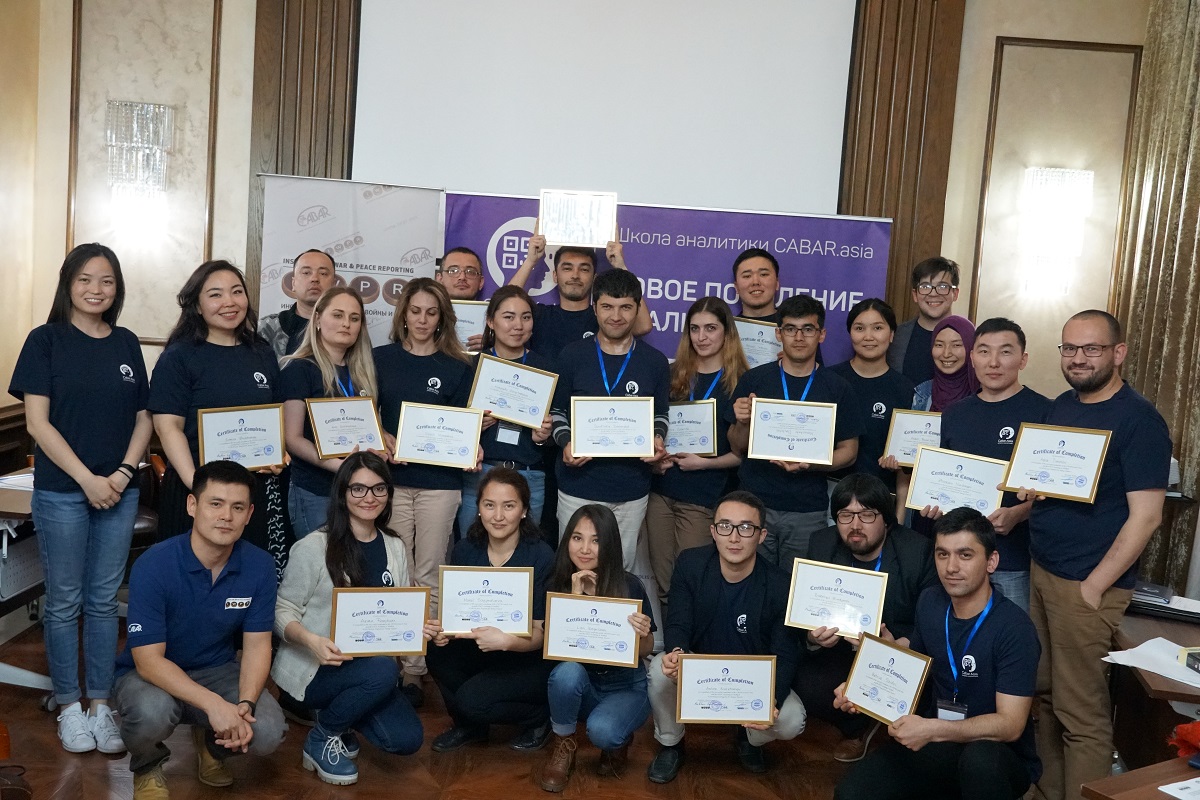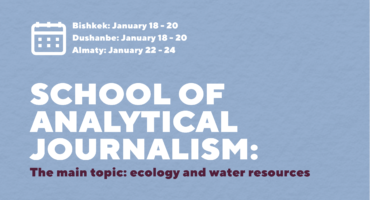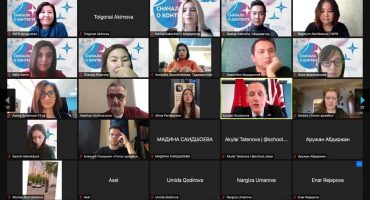CABAR.asia School of Analytics has ended in Almaty, which was attended by young analysts and experts from Kazakhstan, Kyrgyzstan, Tajikistan, Turkmenistan, and Uzbekistan.
The school of analytics was held from April 15 to 21. 21 people took part in it.
The main objective of the educational program is to increase the capacity of young analysts, improve analysis methods, and develop critical and logical thinking, their skills in developing analytical publications, data analysis, visualization, and other important aspects.
The School of Analytics also contributes to the regional integration of young analysts, opens up opportunities for joint research, the production of analytical materials and the exchange of views on various pressing topics of Central Asian countries.
The participants got the opportunity to put their knowledge into practice both within the walls of their own institutions and in collaboration with the analytical platform cabar.asia.
Next year, the best and most active participants of the School will go on a professional internship to one of Eastern Europe’s countries, where they will have an opportunity to exchange experience, views, and gain new knowledge from leading think tanks/analytical centers.
The second cabar.asia School of Analytics was held by the IWPR Office in Central Asia in conjunction with the OSCE Academy in Bishkek.
Within the seven days, the participants have received information on writing analytical articles, conducting research, the basics of critical thinking, and also learned the latest programs for collecting, processing and visualizing data. The trainers were regional and international experts.
On the first day of the School of Analytics, in addition to the introductory presentations of the organizers, Erkin Baidarov, Ph.D., a leading researcher at the Institute of Oriental Studies named after R. B. Suleimenov under the Ministry of Education and Science of the Republic of Kazakhstan, told in detail to the School participants about what is analytics and explained in detail about various types of analytical materials. Sherali Rizoyon, an independent expert from Tajikistan, shared knowledge with the participants about the specifics, the process of writing an analytical product, as well as how the analytical product differs from a scientific article.
Aziza Razykova – School participant from Tajikistan noted:
In the near future, we will achieve the moment when our analytical product will be perceived in higher instances by decision-makers for the benefit of the state and for the benefit of civil society, by increasing our capacity and strengthening our skills.
On the second day, an analyst with experience, the dean of the Graduate School of State Policy and Law of Almaty University of Management Askar Nursha held a session about why analytics is needed and why to develop it. Nursha inspired young specialists with his valuable practical experience in the analytical structures of Kazakhstan and shared useful tips with them.
Further, a professor of the Kazakh-German University Rustam Burnashev gave a valuable lesson about introductory questions in research processes and the choice of analysis methods. For example, about the methods of analyzing event lines (event analysis), thanks to which it is possible to determine the main trends of events and subsequently develop forecasts and scenarios for the situation development.
Yuri Sarukhanyan, an expert in international relations from Tashkent and a participant in the first cabar.asia School of Analytics told in detail and showed with practical examples of what critical thinking is and how to use it as a basis for analysis.
cabar.asia editors – Timur Toktonaliyev and Ermek Baisalov held a session on how to write attractively and intelligibly for analytical online publications, talked in detail about the standards of the cabar.asia analytical platform, and about the opportunities for cooperation.
Then Yuli Yusupov, director of the Center for the Promotion of Economic Development, and a well-known economist from Tashkent, picked up the slack. Yusupov held a lecture on how to influence the decision-making process through analytical materials on the example of Uzbekistan.
On the same day, participants of the School of Analytics took part in a round table organized by IWPR on the topic “Joint research of Central Asian countries: problems and prospects”. At this event, the scientific workers, researchers, and experts from the region shared the situation on the level of their cooperation and the problems encountered in conducting joint research in the region. The possible ways to establish a sustainable interaction among the scientific and expert communities were also discussed and proposed.
On the fourth day of training, Ilya Shepelin, a journalist and a presenter of the Fake News program on “Dozhd” TV channel, gave a detailed master class on how to recognize and deal with fake news; how to “correctly” read the news and told about the available tools for the fact check. The School participants during the practical classes checked the plots of some TV news for authenticity.
In the afternoon, the director of the Tajik Center for Sociological Research “Zerkalo” Kakhramon Bakozoda, held a detailed practical session on what applications are used for qualitative and quantitative data and their processing, on the development and adjustment of the questionnaire, on focus groups and nuances in composing questions.
The fifth day began with the continuation of the previous session about research. Then, there was the training held by Roman Vakulchuk – a senior scientific worker of the Norwegian Institute of International Affairs – NUPI. Vakulchuk’s session consisted of two parts: in the first part, he spoke about how the work of analytical centers is arranged in theory and practice; in the second part, the trainer shared his knowledge about the features of research in developing countries, on the example of Central and Southeast Asian countries.
During the sixth day, Anastasia Valeeva – a trainer and teacher of data journalism at AUCA and a participant in the first cabar.asia School of Analytics, together with Altynai Mambetova – co-founder of the Kyrgyz public foundation “Data School”, taught participants the basics of data visualization. In particular, there were considered various types of graphs, infographics, review of online tools such as Datawrapper, Flourish, Google Datastudio, which will help young analysts to convey information and figures to the reader in an easier and more intelligible form.
The participant from Kyrgyzstan and senior lecturer of “Ala-Too” international university, Maral Sagynaliyeva noted:
The seventh day of the cabar.asia School of Analysts began with a master class of the Kazakh political scientist and international journalist Eduard Poletayev. He gave the School participants detailed information on how to cooperate with journalists and how to “sell” their research. The second half of the last training day was devoted to the analysis of pressing problems through the understanding of processes in the past. This session was held by the head of the Kyrgyz analytical center “Polis-Asia” Elmira Nogoibaeva.
In addition to various formal lectures within the School of Analytics, the participants themselves conducted interactive presentations about their countries during the week, sharing interesting facts, traditions, and customs with the participants from other republics of the region.
Following the results of the second School of Analytics, the participants supplemented their previously prepared articles with fresh details and elements, thanks to the acquired new knowledge. Materials of the School of Analytics participants will soon be published on the analytical portal cabar.asia. In parallel with their current work, graduates of the School now have a great opportunity to become regular contributors to the cabar.asia publications, where they can highlight regional problems and issues.
The cabar.asia School of Analytics is held in the framework of the IWPR’s “Giving Voice, Driving Change – from the Borderland to the Steppes” project, supported by the Norwegian Foreign Ministry. A similar school is held for young journalists from Central Asian countries.
If you have found a spelling error, please, notify us by selecting that text and pressing Ctrl+Enter.






